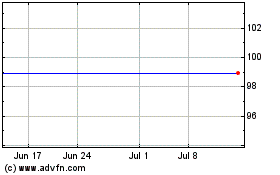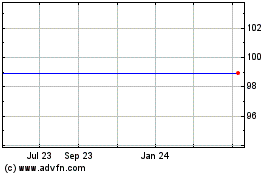Lawmakers Voice Concerns Over AT&T Deal for Time Warner -- Update
December 07 2016 - 11:32AM
Dow Jones News
By John D. McKinnon
U.S. lawmakers on Wednesday expressed wide-ranging concerns
about AT&T Inc.'s blockbuster $85 billion deal to buy Time
Warner Inc., a reaction that suggests the deal could come under
renewed political pressure.
Sen. Mike Lee (R., Utah), in opening a Senate antitrust
subcommittee hearing on the proposed merger, said the deal could
lead to "potential anticompetitive favoritism."
The merger's potential impact could include price and access
problems for competitors seeking Time Warner's prized content, such
as HBO, Mr. Lee said.
He also worried that the deal could create a new problem for the
industry and consumers in the form of AT&T's plans to exclude
its online video offerings from its wireless data caps. Critics
worry that could turn AT&T into a powerful gatekeeper for
consumers' content, Sen. Lee noted.
Sen. Charles Grassley (R., Iowa) also noted questions about the
merged company's ability to employ "'bullying' tactics to dictate
rates and terms to other networks." Mr. Grassley cited "concern
that this acquisition will concentrate too much power into one
conglomerate," as well as "concern about the merger's implications
for a free and diverse press."
AT&T Inc. Chief Executive Randall Stephenson said Wednesday
that AT&T is a communications company that distributes content,
while Time Warner is a content creator. The merger "eliminates no
competitor," he says -- a classic vertical merger.
"We want to get the most content to the most people at the
lowest prices, " he said.
Time Warner chief Jeff Bewkes said the deal would allow his
company to continue innovating in content as well as in consumer
experiences, for example by adding more interactive features to
video products. Case in point is a concept called "TV Everywhere,"
which Mr. Bewkes championed in June 2009 as a way to allow people
to take their pay-TV subscriptions with them and watch TV on mobile
devices by "authenticating" with their cable operator's credentials
to stream channels like TNT live.
Antitrust enforcers in the Trump administration will ultimately
decide whether to approve the deal or block it as anticompetitive,
so the senators will have little or no say in the outcome. However,
members of Congress can both reflect and contribute to the public
mood regarding the merger of such large, high-impact
businesses.
The merger deal has taken flak from Mr. Trump, who criticized it
on the campaign trail as too much concentration of power and
promised to block it.
Sen. Amy Klobuchar of Minnesota, the committee's top Democrat,
also expressed concerns. But the worries of the Republican
lawmakers, who are often apt to take a pro-business approach, was
especially notable, and may reflect in part a recent surge in
populist sentiment in both parties.
Write to John D. McKinnon at john.mckinnon@wsj.com
(END) Dow Jones Newswires
December 07, 2016 11:17 ET (16:17 GMT)
Copyright (c) 2016 Dow Jones & Company, Inc.
Time Warner (NYSE:TWX)
Historical Stock Chart
From Mar 2024 to Apr 2024

Time Warner (NYSE:TWX)
Historical Stock Chart
From Apr 2023 to Apr 2024
